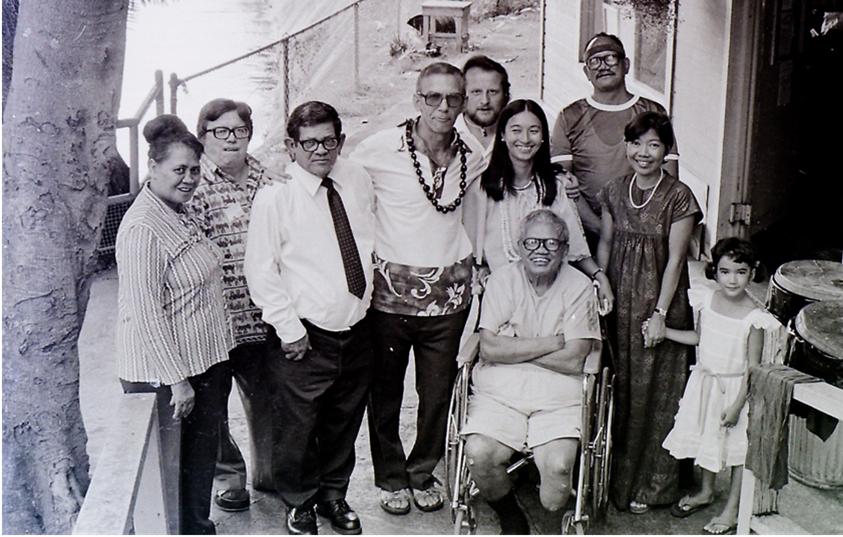Pressenza runs this sequel to Edward M. Gerlock’s Priestly solidarity with poor farmers and “Father, did you not realize that to oppose the banana companies is subversion!”.
by Edward M. Gerlock
I was never particularly fond of being in the Manila area (until now!). I thought and prayed about what my alternatives were now that it would become my “new home”.
At the time, my only alternate Philippine language was Cebuano.
In the past, there were large chunks of Manila that were “ethnic” – meaning that they represented in large part people from other areas of the country. (There is an Igorot Village in Cainta!)
There is a large estate in Quezon City (Tatalon) that is divided into a number of language areas (Bicol Brigade, Cebuano, etc.)
I decided to go investigate. All the people in the “Visayan Area” (at that time) came from Palompon, Leyte. As you would expect, the visit went well and I inquired about the possibility of “moving in”. I think this may have shocked a number of people… an American priest wants to live in the area but (as you would expect!) people found a place that was more than adequate – a simple barong-barong with an inbuilt toilet (and as it turned out rent free!).
House to house
Summarizing a few months of house-to-house – we decided we needed a chapel of our own (actually, we were half a block from Sto. Domingo Church – but that was Tagalog!) Where would we get the money to build such a chapel? I suggested we go ask Cardinal Sin. It’s quite a long story but not only did he give the money but came to bless the place when it was completed. (I might add this did not go over well with the Dominicans across the street.) It was not only a chapel but a meeting place and eventually a small carinderia during the week.
Water
I had hoped for more difficult mobilizations to follow (for example: how is it that a major hotel has a waterfall at the entrance and we had to line up very early at the water pumps every day?).
Honolulu
I think I was there less than a year when the infamous Colonel Rolando Abadilla came to get me and escort me out of the country. Anticipating just such a move, I had hidden my passport on the mistaken belief that one could not travel without a passport. I still remember his response. “If they allowed me, I would get that passport out of you!” I had no doubt he would. Once he started working me over, I would think of dozens of places where the passport could be!
One funny note: I was accompanied by a kindly guard from immigration and upon arriving at immigration in Honolulu in a crowd of fellow passengers, my guard pulled out a declaration and read (too loud, I thought): “This man has been deported from the Philippines as an undesirable alien!” I could feel the eyes of the crowd on me…. “What is he?? Murderer? Rapist?? Smuggler??
One sad note: not long after, Colonel Abadilla was on his way to work when he came to a 4-way stop sign. The “Sparrows” urban assassination squad of the New People’s Army awaited him at the stop sign and made the stop a permanent one.
Marriage
Ching and I were involved in the struggle of a group of leprosy patients when we lived in Hawaii (the State wanted to relocate them to a hospital, and they wanted to live in a community).
Ching and I were married in 1980 in the home of the leprosy patients. We thought the marriage signified our two goals: to grow in love for one another and to commit our lives to service for others.

Ed and Ching in Hawaii.
Lay mission
Eventually, I went back to the “Mother House” at Maryknoll and submitted papers to resign from the priesthood but inquired about the lay mission program. My wife, daughter, and I went to language school and to work in a slum area in Caracas, Venezuela.
People Power Revolution
One day, four years later, I picked up the local newspaper (El Universal) that contained an article on the “Edsa Revolution”. Included in the article was the name of the new Secretary of Justice Sedfrey Ordoñez who was from the office of Senator Salonga and was the companion of Senator Tañada during my trial…. I felt it was a sign from God… It was time “to go home”. (to be continued)
About Edward M. Gerlock
I was born on February 2, 1936, in Binghamton, New York. I have an older brother who was a priest in the diocese who recently died and a much younger sister who lives in New York. My parents were both factory workers and we went through some difficult times during my childhood. I myself began working at the age of 12 and entered Maryknoll, a missionary society the day after graduating from high school.
Ordained in June of 1962, I was assigned to the Philippines. It was the time of the Vatican Council and renewal in the church and I was delighted when the bishop asked me to be a chaplain for a rapidly growing organization of farmers, the Federation of Free Farmers. The organization grew rapidly in Mindanao.
On the first day of martial law, I was arrested and restricted to the poblacion in Tagum, Davao Del Norte.
A year later, I was rearrested and brought to the detention center in Camp Crame in Manila. A trial followed at Immigration which lasted for 13 months, during which I was transferred from Crame to the immigration prison at Engineers Island. At the end of the trial, I was released but restricted to the Greater Manila Area. I found a place to work and live in Tatalon, Quezon City, an urban poor area.
In the meantime, I also taught at a graduate school in Malate, the Asian Social Institute (ASI). It was there that Colonel Rolando Abadilla found me and brought me out to the airport for deportation.
I resigned from the priesthood in 1980 and rejoined Maryknoll as a lay missioner in Venezuela. Upon reading of the “Edsa Revolution”, we returned to the Philippines and presently enjoy a family life as a married couple and two children.










